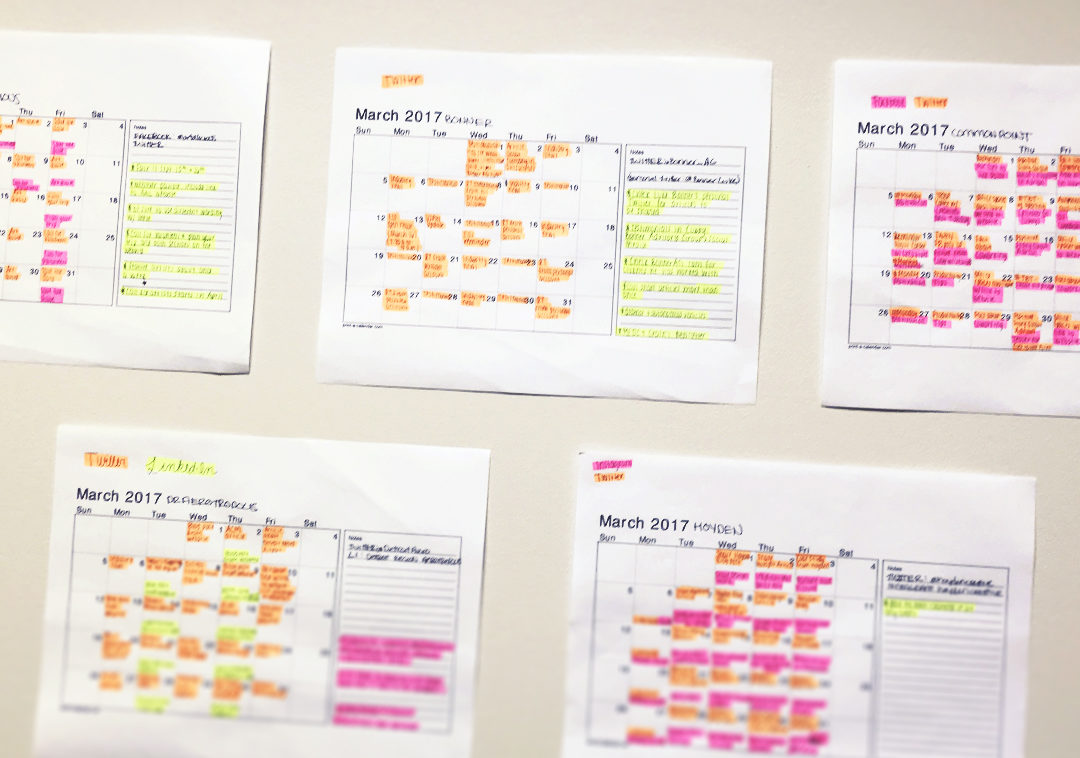
Communication, Marketing, Social Media, Strategy
Have you heard about Brad’s wife? If you haven’t, let me catch you up. It’s trending everywhere on social media right now. Hashtags abound: #bradswife, #justiceforbradswife, and #notmycountrystore. Memes are everywhere. To say it’s gone viral would be an understatement.
Recently, a guy named Brad posted a question as a comment on a post on Cracker Barrel’s Facebook page.

It then took off with a life of its own. A comedian posted about it on twitter and then the Internet did what the internet does best. Every single post from Cracker Barrel on social media is hounded with comments about Brad and his wife.




Is it funny? Yes, which is why everyone keeps participating. Part of what keeps it amusing is that Cracker Barrel has yet to respond. At all.
Other companies are responding. Chick-fil-A is apparently offering her a job.

I even saw a politician promising justice for the couple and an economy that produces a job for Brad’s wife. The memes? The memes are hilarious:

Even the Chicago Tribune is covering the story and reached out to Cracker Barrel for comment, yet they remain silent.
This, combined with the recent United Airlines leggings Twitter scandal, really illustrates how something simple on social media can blow up in a really big way. We also learn how the competition can take advantage of your bad situation for their own benefit.
What does this mean to you? It’s a good time to take a look at how you are handling your businesses social media accounts.
Three Important questions you should be asking yourself:
Is social media part of your marketing strategy?
Sadly, for some businesses this simply isn’t true. Maybe you are a small business and that’s one mountain you’ve yet to climb. Maybe you’ve created the accounts, but you have no time to dedicate to them. Maybe you just don’t understand social media. It’s time to leave those excuses (while very valid) behind, and get on board the social media train. Leverage its power for good and let it convey your marketing messaging to the world.
Is it an afterthought?
This shouldn’t be something that you do when you can get to it or you think about it. Posts should be planned and scheduled. Your accounts should be engaging. If you are doing it right, your social media accounts very quickly become the face of your business and often become your customer service department. This makes it one of the most important aspects of your business and how you present yourself.
Who is managing your social media accounts?
Is the person managing your social accounts able to give it the attention it deserves? Do they have the expertise to leverage your message to the right audience? Social media management is both a science and an art form – as platforms change and pivot, sometimes even weekly, you have to change with them.
Does the person that manages your accounts have the right tools in place to be able to respond quickly and effectively when a crisis happens? In the case of Cracker Barrel and United Airlines, had the response been timely and accurate the stories would not have become the negative press that they have.
There are ways to leverage a social media crisis for good.
Dippin Dots recently did. In just 64 hours, they were able to leverage what could have a nightmare into more great press than “11 Superbowl ads”. Why? They had professionals handling their accounts. The organization and their social media team determined that not responding was not an option. Then they strategically determined a response that fit their brand and led to massive attention.
Shama Hyder, CEO of Marketing Zen and Dippin Dots social team, recently spoke to Social Pros Podcast on how they used the controversy to Get 1 Billion Social Impressions. “Taking advantage of the opportunity, doing it in a way that wasn’t going to offend people, sticking to the brand values – we knew it was a risk. But it was a calculated risk that the leadership was willing to take.” And boy did that risk pay off for them in all the right ways.
She further speaks about how responding on social media isn’t necessarily about making your customers happy at all costs, but utilizing your customers to spread the message that you want to spread.
What’s Your Plan?
Social media strategy is a talent. A science AND an art. If your business has active social media accounts this is the year to put together a plan for handling angry customers, viral negativity, and irritable commenters.
When the crisis arrives you must be prepared to handle it properly. Work with your internal marketing team or talk with the Hoyden team to develop a plan that can be executed in times of trouble.
If you do, amazing things can happen for your business. But get it wrong and you may pay in ways that will hurt – like the symptoms of a bad virus.

Communication, Marketing, Video
 I don’t know about you, but I am a visual learner. They say it’s because I am a part of the “Sesame Street Generation.” The generation who grew up learning our ABCs from Big Bird before we even attended kindergarten.
I don’t know about you, but I am a visual learner. They say it’s because I am a part of the “Sesame Street Generation.” The generation who grew up learning our ABCs from Big Bird before we even attended kindergarten.
By the time we reached our teen years, we learned that Video Killed the Radio Star and became, quite enthusiastically, the “MTV Generation”. We liked our music by video, thank you very much, and nagged our parents obsessively until we got it. Anybody else remember screaming “I want my MTV!” every day for months until they added it to your cable package?
 We got our news every morning at school by video piped right into our classroom via Channel One. Anderson Cooper and Lisa Ling told us about what was going on in the world. We watched Communism fall, the first Gulf War, the Rodney King riots, and the OJ Simpson trial this way.
We got our news every morning at school by video piped right into our classroom via Channel One. Anderson Cooper and Lisa Ling told us about what was going on in the world. We watched Communism fall, the first Gulf War, the Rodney King riots, and the OJ Simpson trial this way.
We learned about the Holocaust by watching Schindler’s List, the Civil War by watching the Civil War PBS documentaries, and the birds and the bees by a wonderful reel-to-reel film they wheeled into your classroom in 5th grade.
This has led to a lot of communications studies which tell you that if you want to communicate effectively to those of my generation or later, you need to incorporate video. That can’t be your whole strategy, obviously, but it needs to be an integral part of it. It is how we grew up learning to learn, and it’s one of the best ways to get the message across to us.
As the internet has grown, and social media has expanded, video continues to grow and develop as an excellent medium to communicate your message. But the question remains, how can you effectively incorporate video into your marketing strategy to reach your target market?
6 ways you can incorporate video into your marketing message:
 Commercially produced videos by a high-quality, professional video production company are an excellent option for several projects including television advertisements, event videos, educational videos, and longer promotional videos.
Commercially produced videos by a high-quality, professional video production company are an excellent option for several projects including television advertisements, event videos, educational videos, and longer promotional videos.- Creating a YouTube channel for your company is a great distribution channel for your videos – either those professionally produced or those you do with your own video equipment. Build your subscriber base and deliver enticing, relevant content and you’ve got a great way to market yourself, your products, and your message. If a 10 year old can build a multi-million dollar empire doing make-up tutorials from her bedroom, you too can conquer YouTube.
- Facebook Live is a recent new video development in the world of Social Media. You can go live from your Facebook page and share with anyone who has “liked” your page. Better yet, it offers a chance for real-time interaction with viewers who can watch live, comment, ask questions, and give feedback. It is a great way to increase your Facebook affinity with people who “like” your page, which will help your social posts show up in the newsfeed without having to pay to boost your posts.
 While Vine itself has gone away, the idea of a vine has not. Short, succinct videos recorded on any smart phone can be uploaded on Instagram, Snapchat, Facebook, or Twitter. It doesn’t need to be long to be powerful or reach your audience.
While Vine itself has gone away, the idea of a vine has not. Short, succinct videos recorded on any smart phone can be uploaded on Instagram, Snapchat, Facebook, or Twitter. It doesn’t need to be long to be powerful or reach your audience.- Creating a viral video often feels like the holy grail of digital marketing, and we all want it. We want to create something that gets shared over and over again and increases our reach ten-fold. The best way to do that is to connect emotionally with your audience – create something touching, heartwarming or funny. You want to elicit a positive emotional response that people can’t help but want to share with others.
- Video and pictures are colliding now-a-days in entirely new ways. Whether it is an animated gif or a looped video created by Boomerang, it’s an important, effective way that people are now communicating. Find a way to deliver your messages in this medium. They are share-able, like-able, and powerful.
If you need help figuring out how video can fit into your overall marketing strategy, please do not hesitate to contact us. We are full of ideas on how to expand your reach through video in 2017.

Communication, Strategy

We know the phrase, “the customer is always right” all too well. But what if that’s not always the case? What if the client isn’t right for your business? It’s naïve to think that every customer that comes along is a perfect fit for you and your company. (Although it would be amazing if that were the case!) It’s tempting to try to make it work with every client, but doing so could hurt your business in the long run.
So, how do you identify your ideal client?
Before you identify your ideal client, you need to get to know your company first. Sit down with all the top dogs and discuss these questions:
- What does your company value?
- What is your business’ style?
- What is your company’s tone of voice?
- What kind of work do you want to be associated with?

Make strategy, not war
Once you know what your business is all about, invite your client to a strategy session. Sit down together and review everything your client is looking for. Listen closely and ask a lot of questions. The client may be vague about some things, so it’s important to understand what you are getting yourself into. If a red flag comes up, whether it be a difference in opinion on a topic or a lack of understanding on how much time something will take, bring it up and talk it out. It is better to put everything on the table from the get-go so that there are no surprises down the road.
If you’re completing a specific project or deliverable for them, figure out every aspect that will need to go into the project and make sure it’s something your firm can handle. It’s important to understand the vision and style the client imagines so you both will be happy with the result.
But Money…
If you’re just starting out, it’s hard to not let money be a factor in deciding who you do or don’t work with. Even if your company has been around for a while, this still may be a factor. Try your hardest to not money make your decision for you. If your goals and values do not match up, then don’t take on the project. You want to be free to pursue and take on clients that are closer to your ideal.
Even if everything check outs on paper and it seems your partnership will work, something still might pop up that will force you to reassess. It’s okay to periodically step back and look at the bigger picture. In fact, you should be scheduling regular review sessions to ensure that everyone is on the same page. It is easy to get lost in the weeds and lose sight of the goal.

The bottom line
Unfortunately, your clients will not have ‘wrong’ or ‘right’ stamped on their forehead. There are certain signs you can pick up on to help realize when it might not work:
- They aren’t respectful towards you and your coworkers.
Some clients are easy to dismiss: those that are blatantly rude or overly-critical. This also includes calling you or demanding your attention at inappropriate times, ignoring your recommendations in favor of less effective measures, or even not being up front about budget and project costs.
- You’re not enjoying the work.
This is a major red flag that should set off alarm bells. Do you procrastinate on this project, but are an eager beaver on others? Take some time to figure out what is stressing you about this client. Is it a factor that is within your control, or theirs?
- They eat away at your finite resources.
We only have so many hours in a day, so much money in the budget, and so much patience and courtesy. If your client is taking up more than their share of these resources, it’s time for a frank discussion.
Letting these behaviors go on can result in a lack of productivity, bad reviews of your work, and a loss of employee trust. Is this really how you want to run your business?
Always trust your gut. If you have a bad feeling about a client, it’s okay to politely tell them it won’t work out. There are more clients out there waiting for you to make magic for them.

Communication, Marketing

Have you ever played a game with a child? If not, I highly recommend it. I have a 3-year-old at home and playing games with her never ceases to be entertaining. The best time is when we play games that she comes up with herself. It doesn’t take a kid very long to figure out that winning is fun and losing is not so much fun. Amazingly enough, as we play the game that she has created, the rules suddenly change mid-game so she emerges the victor.
Working with your search engine optimization (SEO) on your website can feel a little bit like that sometimes. Just when you think you have it figured out, the rules suddenly change mid-game and you are sitting there wondering what happened.
Search engines are continuously changing the rules – the algorithms that they use to calculate page-rankings are constantly being altered and updated. What does that mean for you? That you also have to constantly alter and update your website so it consistently shows up on page one when your target market does a search online. That way you emerge the victor over other companies that are doing the same thing.
Here are some tips you can do right now to help you enhance your website’s SEO:
- Is your website mobile-friendly? Google is ranking mobile-friendly websites more highly than those formatted just for desktop reading. As more and more users search the internet on their phones, this is becoming more and more important.
- Does your website contain the content they are searching for? It’s not just enough anymore to have a have a few key words or search phrases here and there. Now, you need to have interesting and relevant content, and lots of it. For example, if you sell apples – you should talk about apples on several pages and in great detail. The more relevant content you have surrounding a search term or phrase, the higher your page will be ranked.
- Is your website design user-friendly? Can people find the information that they are looking for when they get there? What is your average user’s experience? Clicks and time spent on your website still matter.
- How is your website security? Are your plug-ins up-to-date and is your website free of malware? Security issues will affect your page ranking.
If all of this seems too complicated or overwhelming for you, considering bringing in some professionals to help you keep up with the constant changes in the Google search game. With help, you can continuously update your content so that you emerge the victor over your competitors in online searches.

Communication

Looking for the Holy Grail of web content? You know, the blog post people can find through a quick Google search and leaves them happy they took time to read it. The article that they will want to share with a friend. Writing that instills trust, shows authority, and leads them to take action. It’s attainable. Really, it is!
Write it with Your English Teacher in Mind
What will writing full of errors say about your company? Nothing much, that’s for sure! Does this mean that you need to be a career writer to write articles, blog posts or marketing messages? By all means, no. But you do need fundamentals like using solid grammar, writing concise statements, and having a logical flow of ideas. Need help? Useful online tools include the Grammarly plugin and the Hemingway app. If you are still struggling, don’t be too proud to call in help.
Keep it Audience-Focused
To take clean writing to the next level, it needs to be audience-focused. Start with the utmost basic questions:
- What information does your intended reader want and need?
- How do they want and need to receive said information?
There’s a big difference in writing for an audience that wants a top 5 list with loads of pictures an one that is relying on data and case studies. That said, make sure you are asking plenty of questions to get on the right track. The more customized the writing for your intended audience, the more likely they will be delighted and keep coming back. So don’t settle with the starter questions – getting to know your audience well is not only a must-do if you want to write well for them but it will also lead to all kinds of other discoveries.
Make it Useful to the Reader
Few of us these days have the time or patience to dig through articles looking for the information we need. In all seriousness, haven’t we all clicked the promising headline only to find out the underlying content is utterly useless? That’s a frustrating feeling; don’t pass it on to your readers. Deliver on your promised content. It’s what is going to seal the deal when it comes to earning your readers’ trust. Here’s a pro tip especially for those writing on a topic they know in-depth: use a proof reader with less familiarity. Does their take away match what you intended? Kudos if it does. If it doesn’t, get moving on some revisions.
Optimize it for Search
Search engine optimization (SEO) is a broad field with ever-changing techniques. There is a tremendous amount of information to learn before considering yourself a master, but don’t let that stop you from implementing the basics. Start with brainstorming a list of words and phrases people will use to find you online. Compare those to the writing on your own website pages. Do they match? If so, give yourself a high-five. If not, see how you can edit your content to weave in those words and phrases but do so in a natural tone, make sure to write for people, not robots. Get bonus points with SEO if you can implement these things in the first paragraph of text, titles, and headers.
In general, don’t write for someone in a way you would not speak to them. It does get noticed and not in a way that is in your favor. Put in the time and effort and you’ll be rewarded with increased web traffic, leads, and sales.


![]()







 I don’t know about you, but I am a visual learner. They say it’s because I am a part of the “Sesame Street Generation.” The generation who grew up learning our ABCs from Big Bird before we even attended kindergarten.
I don’t know about you, but I am a visual learner. They say it’s because I am a part of the “Sesame Street Generation.” The generation who grew up learning our ABCs from Big Bird before we even attended kindergarten. We got our news every morning at school by video piped right into our classroom via Channel One. Anderson Cooper and Lisa Ling told us about what was going on in the world. We watched Communism fall, the first Gulf War, the Rodney King riots, and the OJ Simpson trial this way.
We got our news every morning at school by video piped right into our classroom via Channel One. Anderson Cooper and Lisa Ling told us about what was going on in the world. We watched Communism fall, the first Gulf War, the Rodney King riots, and the OJ Simpson trial this way. Commercially produced videos by a high-quality, professional video production company are an excellent option for several projects including television advertisements, event videos, educational videos, and longer promotional videos.
Commercially produced videos by a high-quality, professional video production company are an excellent option for several projects including television advertisements, event videos, educational videos, and longer promotional videos. While Vine itself has gone away, the idea of a vine has not. Short, succinct videos recorded on any smart phone can be uploaded on Instagram, Snapchat, Facebook, or Twitter. It doesn’t need to be long to be powerful or reach your audience.
While Vine itself has gone away, the idea of a vine has not. Short, succinct videos recorded on any smart phone can be uploaded on Instagram, Snapchat, Facebook, or Twitter. It doesn’t need to be long to be powerful or reach your audience.





